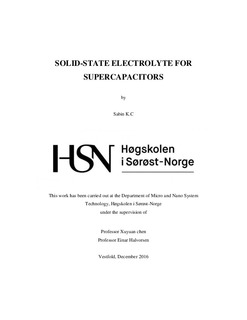Solid-state electrolyte for supercapacitors
Master thesis
Permanent lenke
http://hdl.handle.net/11250/2466413Utgivelsesdato
2016Metadata
Vis full innførselSamlinger
Sammendrag
Renewable energy has become a primary focus for scientific community since last decade. Great interesting investigations and creative works have been carried out to develop technology for powering our society, including disrupt technology for efficient energy storage and power manage. Supercapacitors (SP) also known as electrochemical double layer capacitors uses high surface area active electrode materials and various electrolytes to achieve capacitance of several order magnitude greater than the conventional capacitor, which allows energy density greater than that of conventional capacitors and power density greater than that of batteries. Electrolyte with suitable properties like high Conductivity, Thermal and Mechanical Stability, high charge Mobility, wide Electrochemical Stability Window (ESW) and compactible active electrodes are required for supercapacitors of high performance.
In this thesis work, our aim is to develop solid state electrolyte for high working voltage supercapacitors. First, gel polymer is prepared by using the poly vinylidene fluoride co-hexafluoropropylene (PVDF-HFP) with Acetonitrile and ionic liquids 1-ethyl3-methylimidazolium tetrafluoroborate (EMIM-BF4) and 1-ethyl-3-methylimidazolium dicynamide (EMIM-DCA). Second, ion conducting promoters, such as, Zeolite and reduced Graphene oxide were added. The polymer electrolytes are characterized by a simple supercapacitor configuration, in which the active electrodes are prepared by mixing the Multiwalled Carbon Nanotube (MWCNT), PVDF-HFP and acetylene black/carbon black (CB), and Graphite sheet (GS) is used as current collector. The polymer electrolyte is sandwiched in the structure. The electrochemical working station is applied for the performance measurements. We obtained different characteristics of the supercapacitors, listed as, impedance spectroscopy, ion conductivity, ESW, and cyclic voltammetry (CV).
